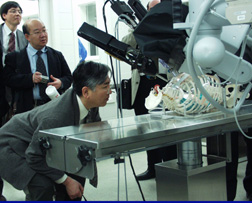 |
Scientists representing the Nanotechnology Researchers Network Center of Japan examine robotic surgical equipment at UNMC. Leaning to get a better view is Kazunori Kataoka, Ph.D., who led the six-scientist delegation to UNMC. Other scientists include Tetsuji Sato, left, and Hisatoshi Kabayashi, Ph.D. |
“I was impressed with the level of expertise of the visiting Japanese scientists, in terms of what they’re doing with the different nanoparticle applications,” said Don Miller, Ph.D., an associate professor in the department of pharmaceutical sciences. “They are very, very advanced in their applications of nanoparticles.”
Six scientists from the Nanotechnology Researchers Network Center of Japan visited UNMC Jan. 5-7 as part of their tour of three universities in the United States. The purpose of their visit was to investigate the latest research trends in biomedical applications of nanoparticles, and to build connections with U.S. researchers in the field, said Kazunori Kataoka Ph.D., the Tokyo University professor who led the delegation.
UNMC one of three destinations
For each of the Japanese scientists who participated in the symposium, this was his first visit to Nebraska. Clarence Ueda, Pharm.D., Ph.D., dean of the UNMC College of Pharmacy, said the symposium afforded College of Pharmacy and Medical Center faculty the opportunity “to demonstrate the type of innovative activities and projects, and outstanding, cutting-edge work taking place in this minute part of the world.
“I feel honored that the delegation of Japanese nanotechnology scientists chose our campus as one of the three institutions to visit during their one week trip to the United States,” Dr. Ueda said. “They could have gone anywhere, University of California, San Francisco, University of Wisconsin, an Ivy League School, etc., and they chose to come here!”
|
|
Besides UNMC, the scientists visited the University of Utah and the University of Washington.
Dr. Kataoka said he was very impressed with UNMC’s research facility, hospital system and educational system.
“I enjoyed very much the conversations with your researchers, and I received a lot of information about your research activities for nanomedicine and drug delivery,” Dr. Kataoka said. “It was, of course, a very good opportunity for me to listen to lectures concerning the latest research on nanomedicine for drug delivery systems and gene delivery in the United States.”
Alexander Kabanov, Ph.D., professor of pharmaceutical sciences in the UNMC College of Pharmacy, said the conference a success.
“Undoubtedly, the conference was successful, scientifically,” Dr. Kabanov said. “I’m happy that we had opportunity to show scientists at UNMC how strong Japanese science in biomedical engineering is, and I’m pleased that we were able to show our expertise to the Japanese scientists.”
Studying nanotechnology
Dr. Kabanov said that UNMC and the Japanese scientists will continue to collaborate, and that UNMC probably would become part of an international collaborative center that will study nanotechnology and specifically, nanomedicine.
Nanomedicine is an emerging field of medicine with novel applications. Nanomedicine is a subset of nanotechnology, which uses tiny particles that are less than one-millionth of an inch in size. In nanomedicine, these particles are much smaller than the living cell. Because of this, nanomedicine presents many revolutionary opportunities in the fight against all types of cancer, neurodegenerative disorders and other diseases.
UNMC uses nanomedicine in research
Currently, Dr. Kabanov’s research team is looking for ways to use nanomedicine to develop drug formulations that will overcome barriers of drug resistance in many cancers. Funded by several federal grants, Dr. Kabanov already has co-invented a polymer formulation that has achieved up to 1,000 times higher efficacy against drug-resistant tumor cells than doxorubicin, a widely used chemotherapeutic agent. Dr. Kabanov’s injectable polymer formulation of doxorubicin is undergoing Phase II clinical trials.
“There are clear applications of nanotechnology or nanoparticles in drug delivery or the gene delivery area,” Dr. Kabanov said. “We can also do imaging by delivering small particles in the tumor, sometimes across the blood-brain barrier. By applying a magnetic field in specific cells, we can trigger drug release or do some other things on the nano-level. A nanoparticle is a little tool, an extremely small tool, and we are developing the tool box that will be necessary to address unmet medical needs.”
Beyond nanotechnology
While they were at UNMC, the Japanese scientists did more than discuss nanotechnology. They attended various social functions, at which they had extended conversations with UNMC leaders, including Chancellor Harold M. Maurer, M.D. and Dr. Ueda. They also tried their hands at mock surgery during a tour of the robotic surgery suite; toured several UNMC facilities, including a DNA micro-array facility at the Eppley Cancer Center, the Munroe-Meyer Institute and the Lied Transplant Center; and visited the UNMC Center for Neurovirology and Neurodegenerative Diseases.
Visitors were “impressed”
The scientists were very impressed, Dr. Kabanov said, with the science and how patients were treated at the Lied Center. They also noted the relatively few administrative “borders” that exist between departments and units at UNMC.
“Normally, in the U.S., more administrative ‘borders’ exist,” Dr. Kabanov said. “But UNMC is one of the best places to collaborate. Sometimes, at universities on the coast, you wouldn’t see that kind of collaboration. Here, it is very good.”